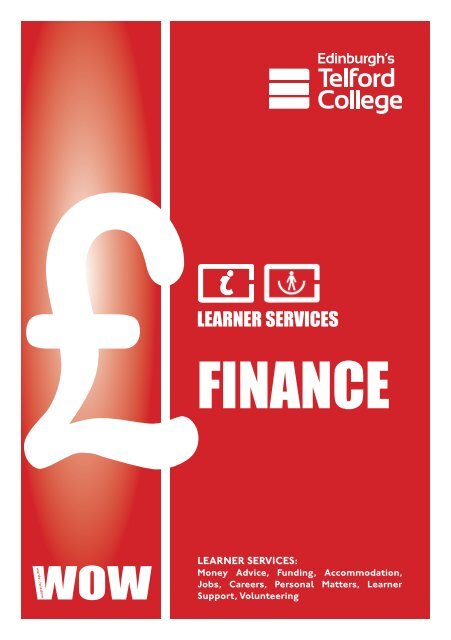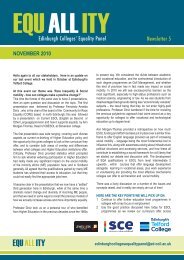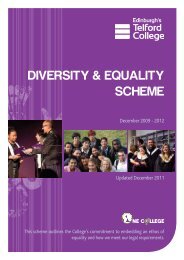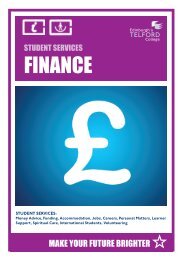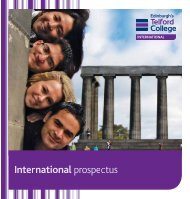FINANCE - Edinburgh's Telford College
FINANCE - Edinburgh's Telford College
FINANCE - Edinburgh's Telford College
Create successful ePaper yourself
Turn your PDF publications into a flip-book with our unique Google optimized e-Paper software.
Learner services<br />
Finance<br />
£Support, Volunteering<br />
wordsofwisdomWOW<br />
Learner Services:<br />
Money Advice, Funding, Accommodation,<br />
Jobs, Careers, Personal Matters, Learner
Contents<br />
Page<br />
Outline of Funding Possibilities for Home Students................... 1<br />
Section A General Information................................................................ 2<br />
Section B Full-time Non-Advanced Students.................................. 3-5<br />
Section C Full-time Higher Education Students............................ 6-9<br />
Section D Part-time Students...................................................................9 -11<br />
Section E Other Funding Available for Students.............................10 -11<br />
Section F Jobzone............................................................................................ 11-12<br />
Section G Advice, Guidance and Support.......................................... 12<br />
Section H Budgeting......................................................................................12-13<br />
Budgeting form............................................................................................... 13<br />
Useful contacts............................................................................................... 14<br />
The information in this leaflet was correct at the time of going to print. However,<br />
information can be subject to change, and it is advisable to confirm the details<br />
with a Learners Services Officer or directly with the appropriate organisation as<br />
required.
Full-Time<br />
Or<br />
Part-Time?<br />
Full-Time<br />
Part-Time Receiving benefits?<br />
What<br />
Course?<br />
Yes<br />
No<br />
Below HNC e.g.<br />
NC, SVQ, NQ etc.<br />
How old are you?<br />
(at start of course)<br />
Under 20<br />
Eligible for EMA<br />
(Educational<br />
Maintenance<br />
Allowance)<br />
Apply via college<br />
NB- Students on certain<br />
benefits can keep their<br />
benefits and claim travel &<br />
course costs via a Bursary<br />
20 or over<br />
HNC or HND<br />
Eligible for college<br />
Bursary<br />
Apply via college<br />
Eligible for SAAS<br />
Loan<br />
(Student Awards<br />
Agency Scotland).<br />
Apply directly to<br />
SAAS online<br />
funding flowchart 2011/12<br />
Edinburgh’s <strong>Telford</strong> <strong>College</strong>, 350 West Granton Road, Edinburgh EH5 1QE<br />
Can apply for<br />
college<br />
Fee Waiver<br />
Can apply<br />
to Student<br />
Discretionary<br />
Fund for travel &<br />
course costs after<br />
starting course<br />
Usually have to pay for course, but<br />
could apply for funding for course fees<br />
depending on level of course<br />
Below HNC<br />
Can apply for<br />
ILA 200 via ILA<br />
Scotland website<br />
Apply to ILA<br />
BEFORE applying<br />
for college<br />
HNC or HND<br />
Can apply for<br />
SAAS Part-Time Fee<br />
Grant. Application<br />
form on SAAS website<br />
You can only apply UP<br />
TO ONE MONTH after<br />
your course starts<br />
Disclaimer - This chart was published without reference to the EMA policy 2011-12, which was unavailable at the<br />
time of publishing. Therefore, this information is subject to change.<br />
www.ed-coll.ac.uk<br />
3
Outline of Funding Possibilities for<br />
Home Students and Standard Course Fees<br />
You should be eligible for some of these forms of support.<br />
Read this booklet for more information and then use this table as a checklist.<br />
HIGHER EDUCATION<br />
HNC / HND Students<br />
10/11 Home Fee<br />
HNC/D courses<br />
£1285 - full-time<br />
or £86 per unit if part-time<br />
(HNC = 12 units)<br />
(HND = 30 units)<br />
Go to page 6<br />
Section C<br />
FURTHER EDUCATION<br />
(Courses below HNC Level:<br />
NC/SVQ/NQ/SGA etc)<br />
10-11 Home Fee<br />
£1008 or £86 per unit<br />
part-time<br />
10-11 Home Fee for<br />
Highers or<br />
Intermediates £174<br />
Go to page 3 Section B<br />
Full time<br />
Part time<br />
Possible Fee exemption –<br />
Fees paid<br />
see pg 9<br />
Student loan ILA 500<br />
SAAS Bursary<br />
Career Development Loan<br />
Supplementary grants<br />
including Disabled Student’s Student Discretionary Funds<br />
Allowance<br />
Student Discretionary Funds Disabled Student’s Allowance<br />
Travel Expenses<br />
(built into funding now)<br />
Career Development Loan<br />
Council Tax exemption<br />
Possible Fee exemption –<br />
Fees paid<br />
see pg 9<br />
<strong>College</strong> bursary<br />
Student Discretionary Fund<br />
Education Maintenance<br />
Career Development Loan<br />
Allowance<br />
Student Discretionary Funds ILA 200<br />
Dependant’s Allowance<br />
Council Tax exemption<br />
The difference between <strong>College</strong> bursary and SAAS funding:<br />
What is a <strong>College</strong> bursary and who can apply?<br />
A bursary is available for learners studying Further Education courses, (see table above) and<br />
is a financial allowance made to assist students while attending college. The bursary fund is<br />
limited. Funds are allocated on a strictly first come first served basis while funds are available. It is<br />
important to apply as soon as a place is offered to you. The bursary form is included in your letter<br />
of acceptance, please fill in and return as soon as possible.<br />
What is SAAS funding and who can apply?<br />
If you’re a Scottish domiciled or EU student studying a full-time Higher National (HN) or<br />
Advanced Diploma course at Edinburgh’s <strong>Telford</strong> <strong>College</strong>, apply to get your fees paid for you. If<br />
you don’t apply, you will be billed for the full amount. Apply online to SAAS. -<br />
www.student-support-saas.gov.uk<br />
1
Section A – General Information<br />
This booklet tells you about how you can fund your studies at Edinburgh’s <strong>Telford</strong> <strong>College</strong> during<br />
session 2010/2011.<br />
You don’t have to read the whole booklet. Just read Section A and then the other sections<br />
that apply to you.<br />
You should plan how you will meet all the costs of studying, including living expenses,<br />
before you take up a place at college.<br />
The <strong>College</strong> expects you to take reasonable steps to bridge gaps in your income, such as finding<br />
part-time work. If you would like help or advice on finding part-time work, please visit Jobzone<br />
in Learner Services.<br />
– Drop-in sessions: Tuesdays & Thursdays 11-1pm.<br />
1. Emergency funds<br />
The college does not have an emergency cash fund. Your loan or bursary might not arrive at the<br />
beginning of the session, if you have applied quite late for funding. If you applied in time, the first<br />
college bursary or SAAS loan payment should be in your account at the end of the first week.<br />
Apply for funding as soon as possible.<br />
• Before you start college, try to save enough money to live on for the first few weeks,<br />
if possible.<br />
2. Tuition fees<br />
2.1. Most Scottish and European Union (EU) full-time students will not have to pay<br />
tuition fees. However, you won’t get your fees paid if you have previously been on a<br />
full-time course at HND or degree level, and you had help from public funds.<br />
2.2. If you’re from another part of the UK, you’re not entitled to free tuition in Scotland.<br />
You must apply to your Local Education Authority (LEA).<br />
2.3. If you’re a Scottish domiciled or EU student studying a full-time Higher National (HN) or<br />
Advanced Diploma course at Edinburgh’s <strong>Telford</strong> <strong>College</strong>, apply to get your fees paid for<br />
you online to SAAS. If you don’t apply, you will be billed for the full amount.<br />
Apply to:<br />
www.student-support-saas.gov.uk<br />
Tel: 0300 555 0505<br />
e-mail: saas.geu@scotland.gsi.gov.uk<br />
2.4. Other full-time learners should refer to the college form “Guidance on When and How to<br />
pay Fees” available from the Learner Servics Office.<br />
WOW<br />
2
SECTION B - Full-time Non-Advanced Learners<br />
1. <strong>College</strong> bursaries<br />
If you’re on a National Certificate, Advanced National Certificate,<br />
SQA, SVQ, BTEC, NPA or Access course, aged over 20 years, apply for a college bursary.<br />
2. Eligible for a bursary and other help with expenses?<br />
2.1. You should have been:<br />
• Ordinarily resident in the UK for the three years immediately before the start of the<br />
course, and<br />
• Ordinarily resident in Scotland on the first day of the first academic year of the course<br />
2.2. European Union (EU) students:<br />
• can apply to get their fees paid, but<br />
• can’t get a bursary and can’t get help from the Student Discretionary Fund unless they<br />
meet residence requirements.<br />
2.3. Study requirements<br />
• If you’ve had financial help for a full-time course in the previous four years, it is possible you<br />
won’t be awarded a bursary, but you should still apply.<br />
• If you’ve already studied at a higher level e.g. HN or degree, you probably won’t get a bursary,<br />
but you should still apply.<br />
• Your course should normally last for up to one year and lead to a recognised qualification.<br />
• If your attendance and progress are not satisfactory, your bursary and other payments<br />
may be stopped. Your attendance needs to be 90%. Any absence needs to be self<br />
certificated.<br />
Make sure that you know, and keep to, the procedures for dealing with absence from college.<br />
3. Applying<br />
3.1. You’ll be sent a bursary application form when you’re offered a place on your chosen course,<br />
but please remember that an offer of a place on a course isn’t a guarantee that you’ll be<br />
given a bursary award.<br />
• If you are from Orkney, Shetland or the rest of the UK apply to your LEA.<br />
3.2. Apply as early as possible because there is a limited amount of money available. Note the<br />
closing date for applications in the Bursary booklet.<br />
• Be sure to include all the information and documents required.<br />
• Get someone else to look over your form before you send it in.<br />
• Contact Bursaries on ext 4032 for more information<br />
Bursaries run drop in sessions please ask at Learner Services reception for more<br />
information.<br />
3
Bursary awards: 2010/2011 figures (weekly rates)<br />
Age on start date of course Living in Parental Home Not Living in Parental Home<br />
Parentally supported (Under 18)<br />
Parentally supported (Over 18- 24 years)<br />
Self supporting*<br />
MA (£30 per week,<br />
subject to income)<br />
Maximum £70.48 (if<br />
gross income is less<br />
than £24,275)<br />
Mazximum £89.07 (if<br />
gross incomes is less<br />
than £20,643)<br />
Maximum £35.40 (if gross<br />
income is less than £20,351)<br />
Maximum £89.07 (if gross<br />
incomes is less than £20,643)<br />
Maximum £89.07 (if gross<br />
incomes is less than £20,643)<br />
*You are a self supporting learner if, by the first day of your course, you:<br />
• are at least 25 years old or<br />
• are married or in an established relationship.<br />
• have supported yourself from earnings or benefits for any 3 years<br />
3.3. If you are under 18 and living in CRM halls of residence, you may be able to get help from<br />
the bursary fund, this could be up to 105.30 per week.<br />
3.4. The first month’s college bursary payment will be in two instalments. If possible,<br />
you should try to save some money before you start your course, to help with payment of<br />
initial extra costs such as a bus pass.<br />
4. Education Maintenance Allowance (EMA)<br />
Some students under 20 will be eligible for an EMA:<br />
• If your course starts in the autumn and you are of school leaving age or under 20 on the<br />
start date of your course you may be eligible for an EMA<br />
• If your date of birth is between 1 October 1995 and 29 February 1996, you may be eligible<br />
for an EMA from January 2012.<br />
4.1. The amount you receive depends on household income, not parental income Students<br />
who qualify for EMA for the first time in 2009-10, will be eligible for a singe rate weekly<br />
allowance of £30 per week.<br />
Income No. of dependent children in Full-time education Award<br />
£0 - £20,351 1<br />
£30<br />
£0 - £22,403 2+<br />
£30<br />
• Normally an EMA can be available for up to 3 years of full time education but you have<br />
to maintain 100% attendance to receive payments. Any absence needs to be self<br />
certificated.<br />
Make sure that you know, and keep to, the procedures for dealing with absence from college.<br />
WOW<br />
4
5. Travel costs<br />
The amount paid is based on the cheapest form of travel, usually a monthly bus pass, and is<br />
included in the monthly bursary payments.<br />
• If you are under 18 on the first day of your course and you live more than two miles from<br />
college, you can apply for a non means tested bursary to cover travel costs.<br />
• If you are over 18 on the first day of your course you can also apply for help with travel costs,<br />
but the award is means tested.<br />
6. Further financial support<br />
61. Dependant’s Allowance if you have legal responsibility for an adult. £50.77 per week<br />
6.2. Student Discretionary Funds (Hardship Fund)<br />
I f you have applied for your full entitlement to a college bursary but you are still in financial<br />
hardship, apply for help with some of the costs of:<br />
• child care • travel • disability<br />
• books and equipment • accommodation • living costs<br />
Application forms for Student Discretionary funds will be available from Learner Services.<br />
7. Disability<br />
I f you have a disability and you have to meet extra costs in order to come to college, you may<br />
be entitled to additional support, for example to pay for essential taxi transport. This help is not<br />
means tested. Apply for this Special Educational Needs Allowance on the bursary application<br />
form.<br />
8. Council Tax Exemption<br />
Full-time learners do not have to pay council tax, but they have to claim exemption. Ask the<br />
local council office to send you the exemption form and your School Support Assistant will<br />
stamp it for you.<br />
You are not automatically exempt from Council Tax. You must register exemption with the<br />
council yourself – Revenuesbenefits@edinburgh.gov.uk Or Tel: 0131 469 5000<br />
9. Benefits<br />
9.1. If you’re on benefits and are not required to be available for work (mainly people with<br />
disabilities and lone parents) you can:<br />
• study full-time and<br />
• claim benefits including Housing Benefit, Income Support/Incapacity Benefit and<br />
• apply for a bursary to cover the extra costs of college attendance e.g. course and exam fees,<br />
books, equipment and travel<br />
You must tell the Department for Work and Pensions (DWP).<br />
Contact a member of the Learner Services Team who will be able to give you advice<br />
regarding benefits.<br />
5
SECTION C - Full-Time Higher Education Learners<br />
If you are studying an HNC or HND full-time read this section and apply to SAAS for<br />
funding<br />
1. Support available<br />
The help with living costs available for home students is a mixture of:<br />
• Student loan<br />
• Young Student Bursary and additional student loan<br />
• supplementary grants<br />
• Student Support Funds (Hardship Fund)<br />
What you can claim depends on your eligibility.<br />
2. Eligibility<br />
To be eligible for help from SAAS with living costs you must:<br />
• have been ordinarily resident in the UK for three years immediately before the first day<br />
of the first academic year of the course. If you were absent only because you or your family<br />
were temporarily employed abroad, you will be treated as if your ordinary residence in Britain<br />
had not been interrupted.<br />
• be ordinarily resident in Scotland on the first day (1 August) of the first academic year of<br />
your course. (Other UK students apply for a loan through their LEA)<br />
• be on a full-time course “designated” for learner support. Before starting a course<br />
students from outside Scotland must always check with their LEA that the course is designated<br />
for funding.<br />
• be under 50 at the start of the course or, if 50 to 54, you must intend to return to<br />
employment when you complete the course<br />
If you are not a UK national you must also be settled in the<br />
UK (Immigration Act 1971) on the first day (1 August) of the first academic year of your course.<br />
3. Student loans<br />
3.1. Applying<br />
If you need help with living costs, apply to the Student Awards Agency for Scotland (SAAS)<br />
for a loan when you apply for payment of your tuition fees. You should apply as soon as<br />
possible after you receive a conditional or unconditional offer of a place on a course.<br />
3.2. Loan amounts for 2010/2011: Part of the money is not means tested and is available<br />
to all eligible applicants, but part is means tested against the income of the student, or the<br />
student’s parents or spouse/partner. You won’t have to start repaying your loan until you have<br />
completed<br />
WOW<br />
6
30 Week Session<br />
1st Year HND<br />
HNC & 2nd Year HND<br />
Living in parental home<br />
Not living in parental home<br />
Living in parental home<br />
Not living in parental home<br />
Maximum non<br />
means tested loan<br />
£605.00<br />
£915.00<br />
£480.00<br />
£785.00<br />
Maximum loan<br />
available*<br />
£4,457*<br />
£5,417*<br />
£3,992*<br />
£4,807*<br />
An additional loan of up to £785 will be available to young learners from families with an income<br />
of up to £22,789, making the maximum support package available to HNC/D Level students<br />
£6,202 where gross income is £18,000 or less.<br />
*If you are eligible for the Young Student Bursary (see next paragraph), this will replace part of<br />
your loan support.<br />
Your loan and any SAAS Bursary will be paid monthly on the 7th of each month.<br />
If the session lasts for more than 30 weeks and 3 days, you can claim additional loan payments<br />
for the extra weeks.<br />
Living in the parental home<br />
Not living in the parental home<br />
£54 per week<br />
£83 per week<br />
If you have questions about payment of your loan, contact:<br />
The Student Loans Company Ltd,<br />
100 Bothwell Street,<br />
Glasgow,<br />
G2 7JD<br />
Tel: 0141 306 2000<br />
www.slc.co.uk<br />
4. Young Student Bursary<br />
If you are a young student at the start of your course, applying to SAAS for the Young Student<br />
Bursary can reduce the amount of loan you need. The Young Student Bursary:<br />
• does not have to be paid back<br />
• is not affected by whether you live at home or not<br />
• but is means tested<br />
• and you may not be entitled if you have previously had support for a higher education<br />
course.<br />
The bursary is available for young students whose gross family income is less than £34,195. The<br />
maximum award is £2,640 for students whose gross family income is £19,310 or less.<br />
If you are eligible for the YSB, you may also be eligible for the additional loan. Maximum is £785<br />
for a family income of £18,300 or less.<br />
7
5. Independent Students’ Bursary<br />
If you are an ‘independent student’ studying in Scotland, you may be eligible for the Independent<br />
Students’ Bursary.<br />
You must meet one of the following conditions:<br />
• Over 25<br />
• Married<br />
• In a civil partnership<br />
• Living with a partner<br />
• Your parents are no longer alive<br />
This bursary is available for learners who meet the criteria and whose household income is less<br />
than £34,195. The maximum rate is £1,000 if your household income is £19,310 or less per year<br />
or if you are single.<br />
6. Supplementary grants<br />
You may be able to claim additional help in the form of non repayable, mainly means tested<br />
grants even if previously you have had help for a full-time higher education course.<br />
You can apply to SAAS for:<br />
6.1. Dependant’s Grant for a dependent husband, wife, civil partner or other adult dependant<br />
who is not a student. Maximum award: £2640<br />
6.2. Lone Parent’s Grant of up to £1,305 if you are a widowed, divorced, separated or single<br />
student with at least one dependent child.<br />
6.3. Care Leaver’s Grant if you were in care immediately before starting your course, or you<br />
were in care when you finished your compulsory schooling to help with accommodation<br />
costs in the summer break. Award: up to £105 per week.<br />
6.4. Disabled Student’s Allowance (DSA) if you have a disability, to cover certain additional<br />
expenses arising because you have become a student. This help is not means-tested.<br />
Contact SAAS for more information or speak to a Learner Support Officer in Student<br />
Services at college.<br />
It is important to apply as early as possible for this help.<br />
7. Other help available through college<br />
71. Student Discretionary Funds (Hardship Fund)<br />
You can apply to the college for help with a grant, not a loan, towards some of the costs of:<br />
• child care • travel • disability<br />
• books and equipment • accommodation • living costs<br />
Before applying, you should have taken up your maximum entitlement to a student loan and<br />
other grants. You must provide evidence to support your application.<br />
Application forms for help from the Student Discretionary Funds will be available from Student<br />
Services.<br />
Learner Services run Funding & Money Matters drop-ins daily from the Learner Services office.<br />
You can speak to a Learner Services Officer about the Discretionary Fund or about any financial<br />
issues you are having. All drop-ins are confidential.<br />
WOW<br />
8
8. Benefits<br />
Most full-time learners can’t claim benefit, but if you are not required to be available for<br />
work (mainly people with disabilities or lone parents) you may be able to study fulltime and still<br />
claim Income Support and Housing Benefit.<br />
When your entitlement to Income Support and other benefits is being calculated, all your<br />
income is generally taken into account including the student loan or any student grants.<br />
It is often the case that a student’s benefits reduce considerably as a result of this. If<br />
you claim benefits, always check with the Department for Work and Pensions (DWP)<br />
before starting a course of study.<br />
9. Council Tax Exemption<br />
Full-time students do not have to pay council tax, but they have to claim exemption. Ask the<br />
local council office to send you the exemption form and your School Support Assistant will<br />
stamp it for you.<br />
You are not automatically exempt from Council Tax.<br />
You must register exemption with the council yourself -<br />
revenuesbenefits@edinburgh.gov.uk or Tel: 0131 469 5000<br />
SECTION D - Part-time Learners<br />
If you are studying any course part-time read this section.<br />
1. Fees<br />
Fees are normally payable for part-time courses, but many learners can claim exemption from<br />
paying fees.<br />
2. Exemption from Tuition Fees * information correct at time of printing. 2011/12 policy<br />
not yet available at time of printing.<br />
2.1. You can apply for exemption from tuition fees if you are a part-time learner student,<br />
over 16, studying sixteen hours or less per week, have been resident in the UK for<br />
the last 3 years AND:<br />
• you or your family are receiving Income Support, Working Tax Credit, Pension Credit or<br />
Housing Benefit or Income-based Job Seekers Allowance, income related employment<br />
and support allowance (ESA) or’<br />
• you are receiving Carer’s Allowance, Disability Living Allowance, Severe Disablement<br />
Allowance, Incapacity Benefit, Attendance Allowance or Contributory Employment and<br />
Support Allowance<br />
• you are in the care of local authority and are living in a foster home or children’s home<br />
regardless of your age<br />
• a state school pupil undertaking college activities forming part of your school based<br />
curriculum<br />
• privately or home educated school pupil<br />
9
• ‘your family’s taxable income for tax year 2009/2010 was equivalent to or less than: £8,282<br />
(households with only one person), £12.395 (households consisting of a couple without<br />
children), £18,977 (households with dependant children)’<br />
You can also apply for exemption from tuition fees if you, your spouse or your parent(s) is an<br />
asylum seeker.<br />
2.2. To apply for exemption, tick the relevant box on the application form and you will be sent<br />
an exemption form if your course is eligible.<br />
3. Jobseeker’s Allowance and 16 Hours Part-time Study<br />
If you are unemployed, you can claim JSA and study part-time, but NOT full-time, because<br />
you have to remain available for work and actively seeking work.<br />
This means:<br />
• you can’t join a full-time course, even if it is less than 16 hours per week<br />
• you can do up to 16 guided hours of study per week. Guided hours means time when you<br />
are being guided towards your qualification through lectures, tutorials, supervised study in<br />
libraries, open learning centres, learning workshops, assessment meetings etc. It doesn’t<br />
include hours where there is just general supervision or help<br />
• you can study up to 16 hours per week in classrooms, workshops etc. If this part of the<br />
course is less than 16 hours per week, you can also study by other methods up to, but not<br />
exceeding, 21 hours per week.<br />
If you hope to study by this method, you should tell the Department for Work and<br />
Pensions (DWP) that you intend to enrol on a course. They will give you a questionnaire to<br />
complete, and you must ensure that you can be reached immediately if a job vacancy comes up.<br />
4. Part-time Further Education Learners<br />
Students on benefits can sometimes apply for a part-time bursary to help with study-related<br />
costs i.e. books, equipment and travel, without affecting their benefits. For details, contact<br />
Bursaries on ext 4032.<br />
5. Part-time Higher Education Learners<br />
ILA Scotland update<br />
On 1 April 2011, ILA500 was replaced with a new Part-Time Fee Grant that will be delivered by<br />
the Student Awards Agency for Scotland (SAAS).<br />
Visit the SAAS website www.student-support-saas.gov.uk to find out more and download<br />
an application form.<br />
To qualify for this funding, you should have an individual income of £22,000 a year or less.<br />
You can only apply for support up to one month after your course starts.<br />
WOW<br />
10
6. Student Discretionary Funds (Hardship Fund)<br />
Both non-advanced and Higher Education students in receipt of fee wavier can apply for help<br />
with a grant, not a loan, towards some of the costs of:<br />
• travel<br />
• disability<br />
• books and equipment<br />
7. Disabled Student’s Allowance<br />
Apply to SAAS for non means tested help with expenses arising because you have become a<br />
learner if:<br />
• you have a disability and<br />
• you are on a higher education part-time course which is equivalent to at least 50% of a<br />
full-time course.<br />
Open Learning Learners can apply.<br />
SECTION E – Other Funding Available for Learners<br />
1. Tax Credits<br />
If you are responsible for at least one child you should be able to claim Child Tax Credit. If you<br />
work more than 16 hours per week, you may be able to claim Working Tax Credit. Contact the<br />
Inland Revenue on: 0845 300 3900 or www.taxcredits.inlandrevenue.gov.uk<br />
2. Career Development Loans<br />
You may be able to apply for a Career Development Loan (CDL) if:<br />
• you are over 18 and<br />
• you cannot get funding to pay for the course you want to do<br />
A CDL can cover up to 80% of course fees plus other costs for any type of full-time, part-time or<br />
distance learning course as long as the course:<br />
• is related to a job and<br />
• lasts no more than two years plus, where relevant, up to one year’s practical experience<br />
where it is part of the course.<br />
However, you have to start paying back a CDL as soon as your course finishes.<br />
If you are claiming, or wish to claim benefits, you should check how your benefits might be<br />
affected if you take out a CDL.<br />
For more information, telephone 0800 585 505 or visit www.direct.gov.uk or ask Learner<br />
Services.<br />
3. Educational Trusts/Endowments/Sponsorship<br />
3.1. I f you’re not eligible for support from public funds, you could consult “The Directory of<br />
Grant Making Trusts”, “The Grants Register” or “The Charities Digest”, which are available in<br />
public reference libraries.<br />
11
3.2. Higher Education students can also ask SAAS to search the “Register of Educational<br />
Endowments” which gives information about Scottish trusts which can help some students.<br />
Many of these are local, and eligibility often depends on where you live or where you were<br />
born.<br />
Enquiry forms should be obtained from SAAS.<br />
3.3. Your local Job Centre should have details about sponsorship and scholarships which might<br />
be available from industrial organisations. Or try www.scholarship-search.org.uk<br />
This booklet has been published in <strong>College</strong> by Learner Services as a guide to your<br />
entitlement to financial help while studying. You are responsible for checking the<br />
information and your situation with SAAS, your LEA, the Student Funding Officer or the<br />
Department for Work and Pensions as appropriate.<br />
Section F- Jobzone<br />
If you need to get a part-time or holiday job to help fund your studies then Jobzone Plus at the<br />
Waterfront for learners can help. We can assist you in finding a job that will fit around your<br />
studies and allow you to develop valuable skills while also giving you the all-important cash!<br />
Jobzone offers support with writing a CV, filling out application forms, interview techniques and<br />
where to look for work. We also offer advice on tax, National Insurance and working regulations.<br />
You can register for Jobzone Plus at our website www.jobzoneplus.co.uk or by dropping in to<br />
Learner Services. Drop-in sessions are Tuesday and Thursdays between 11-1pm<br />
Useful contacts:<br />
National Insurance 0845 600 0643<br />
Job Centre Plus<br />
www.jobcentreplus.gov.uk<br />
Advice on working rights<br />
www.worksmart.org.uk<br />
Making career decisions<br />
www.careers-scotland.org.uk<br />
Section G- Advice, Guidance and Support<br />
For whatever reason, people can find themselves in debt and unable to pay their bills. Edinburgh’s<br />
<strong>Telford</strong> <strong>College</strong> offers confidential advice, guidance and support that may help when there<br />
seems to be nowhere else to turn. (Personal Matters Advice and Referral Service).<br />
Learner Services are also able to offer help and advice regarding:<br />
• budgeting<br />
• money management<br />
• debt help<br />
WOW<br />
12
Learner Services are working with the FSA (Financial Services Authority) to help promote<br />
student’s financial awareness and skills.<br />
For more information about these services and times please ask a member of the<br />
Learner Services team.<br />
Section H- Budgeting<br />
Budgeting is all about balancing the amount of money you have coming in (income), with how<br />
much you spend (expenses). It’s not always easy, but it is very important and helps you make<br />
ends meet.<br />
With an accurate budget, you’ll be able to cut out unnecessary expenses and save money, or<br />
stop running up big debts. If you already have debt problems, a budget will show you how much<br />
spare cash you have.<br />
Here is a possible learner budget for session 2010-11. These figures are only a rough guide as every<br />
student is different and costs can vary a lot<br />
Stacey is studying Digital Media, funded by a college bursary of £3,206.52 (based on<br />
£89.07 per week on a 38 week course)<br />
Your Income £ / monthly Your Spending £ / monthly<br />
Bursary £ 356.28 Rent £ 280<br />
Parental Allowance £ 0.00 Bills (including phone) £ 160<br />
Part Time Job £ 200 Insurance £8<br />
Benefits £ 000 Travel £ 48<br />
Other £ 000 Food & Clothes £ 200<br />
Beer/Wine/ Going Out £ 140<br />
Total Income £ 556.28 Total Spending £ 836<br />
In this example, Stacey’s weekly spending is £297.72 more than her monthly income. If this was<br />
your budget, you would have to take action to close the gap. Stacey could help balance her<br />
budget by doing one or all of the following:<br />
• Taking on more hours at work<br />
• Buying a monthly bus pass<br />
• Cutting back on spending in non-essential areas<br />
• Checking she have claimed all the funding benefits she is entitled to<br />
Remember- your money is your responsibility. The college expects you to take reasonable<br />
steps to manage your money and close the gap between income and expenditure.<br />
If you would like help and advice on budgeting and managing your money, Learner Services run<br />
Funding & Money Matters drop-ins 10.00 – 15.00 Monday-Friday in the Learner Services.<br />
13
BUDGET FORM<br />
Use this form to help you work out your personal budget, calculating your income and<br />
expenditure either per month or per week. Income includes benefits such as Child Benefit,<br />
support from parents, part-time wages etc.<br />
Income Month/Week Expenditure Month/Week<br />
Rent<br />
Food<br />
Clothing<br />
Toiletries<br />
Heating/Lighting<br />
Travel<br />
Childcare<br />
Books/Equipment<br />
Insurance<br />
Telephone<br />
TV Rental/Licence<br />
Social Life<br />
Total Income<br />
Other<br />
Total Expenditure<br />
Is your income less than your likely expenditure? If so, don’t panic, but ask for help and<br />
advice now about how to close the gap.<br />
Don’t let debts of any kind pile up. Start dealing with money problems as soon as they<br />
appear. Don’t just hope that they will go away. Come to one of the Learner Services drop-ins<br />
dealing with money, bursaries etc where you can get free, friendly advice about any money<br />
problem that is troubling you, and where you can check that you are claiming all the support<br />
you are entitled to.<br />
Useful contacts<br />
Bursaries - Tel: 0131 559 4032 / 4025<br />
studentfunding.help@ed-coll.ac.uk<br />
Student Award Agency Scotland (SAS) - Tel: 0845 111 1711 www.saas.gov.uk,<br />
saas.geu@scotland.gsi.gov.uk (General Enquiry Unit) Fax: 0131 224 5887<br />
ILA Scotland - Tel: 0808 100 1090<br />
Email:enquiries@ilascotland.org.uk<br />
www.ilascotland.org.uk<br />
Edinburgh Council Tax Department - Revenues & Benefits Division 0131 469 5000<br />
revenuesbenefits@edinburgh.gov.uk<br />
Department for work and pensions (DWP) - Benefit enquiry line: 0800 88 22 00 (free)<br />
Text phone: 0800 24 33 55 (free)<br />
www.dwp.gov.uk<br />
Student Discretionary Fund - Tel: 0131 559 4209 / 4251<br />
studentfunding@ed-coll.ac.uk<br />
Career Development Loans - Tel: 0800 585 505<br />
Tax Credits - Inland Revenue 0845 300 3900<br />
www.taxcredits.inlandrevenue.gov.uk<br />
Finance Office (Fee Payment / Fee Exemption) - Tel: 0131 559 4026 / 4027 / 4029<br />
Finance@ed-coll.ac.uk<br />
WOW<br />
14
Edinburgh’s <strong>Telford</strong> <strong>College</strong> strives to be an inclusive <strong>College</strong> that welcomes and supports<br />
learners from all age and ethnic groups, genders, abilities, sexual orientations, cultural and<br />
religious backgrounds.<br />
The <strong>College</strong> has developed policies to ensure that unfair discrimination does not occur and<br />
is ethically and legally committed to equal opportunity in all institutional areas of activity.<br />
Appropriate remedial and, if necessary, disciplinary action will be taken in order to eliminate<br />
discrimination wherever it occurs. <strong>Telford</strong> is founded on the principles of creating an inclusive<br />
<strong>College</strong>, one <strong>College</strong> for all.<br />
If you have any questions about funding<br />
please contact us:<br />
studentfunding@ed-coll.ac.uk<br />
Edinburgh’s <strong>Telford</strong> <strong>College</strong>,<br />
350 West Granton Road, Edinburgh EH5 1QE<br />
0131 559 4000<br />
www.ed-coll.ac.uk<br />
15


